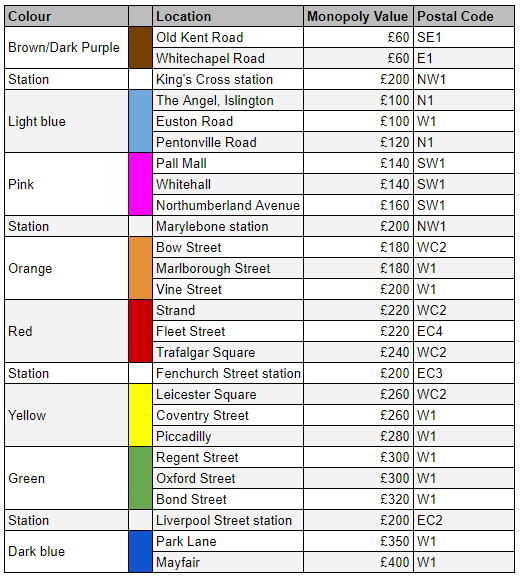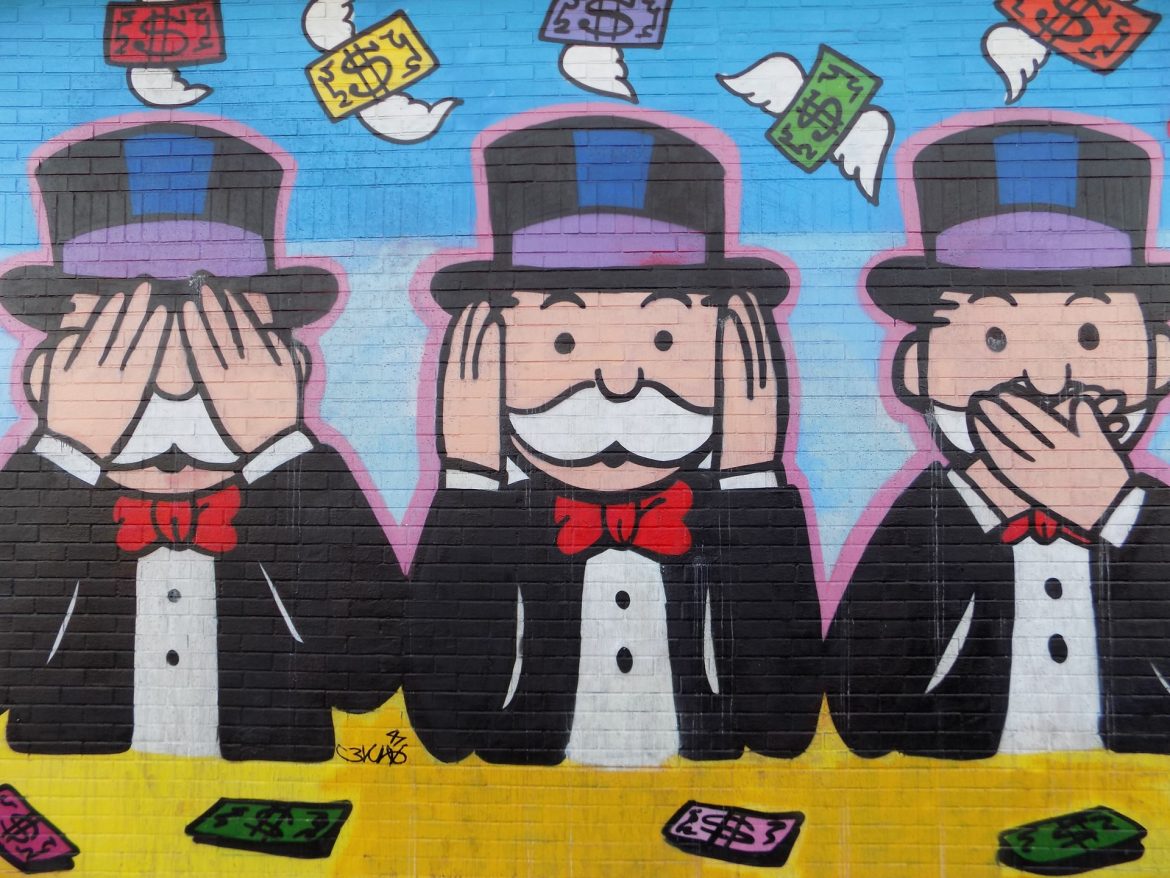When you think of a classic board game, you probably think of Monopoly. Versions of the game have been played by friends and families for over 100 years. Launched in 1936, the Monopoly board UK version was the first edition to be licensed outside of the US. The UK version was based on real locations in London featuring famous streets like Oxford Street and Regent’s Street, making it familiar for British game players.
Watson licensing Monopoly in the UK
Based on the 1906 game The Landlord’s Game, the original US version of Monopoly was created in 1933, which launched Parker Brothers distribution of a version in 1935. The launch was a huge success. The game was licensed to Victor Watson, Sr. of Waddington Games, who launched the Monopoly board UK original version in 1936 featuring famous street names from some of the most expensive areas of London. Today, Monopoly has been translated into 43 different languages and is sold in over 111 different countries worldwide.



Quick Facts Monopoly Board UK
- Victor Watson of Waddington Limited got the UK license in 1935
- Watson scouted the street names visiting London with his secretary
- Launched in 1936, only a year after the original US version
- Featuring famous streets from the most expensive areas of London
- Mayfair is the most expensive street in the Monopoly Board UK version
- Old Kent Road and Whitechapel Road are the cheapest streets (£60 each)
- The cost of a London railway station is fixed at £200
- The average price for a street is £209
- The only street south of the river Thames is Old Kent Road
- The London version of Monopoly was also sold in other countries of the Commonwealth
- The Monopoly locations became popular tourist spots for visitors to London
- There is a Monopoly pub crawl visiting all the locations on the board
- More than 100 different Monopoly Board UK version have been made
Every once in a while, it can be fun to break out the classic game. It’s usually a guaranteed way to keep you busy for a few hours. If you follow the blog, you know I’ve acknowledged how Monopoly could be used as a way to teach your children how to be good losers, but also that there are more gentle ways of teaching the lesson with games that won’t result in tears.

Monopoly causing hurt feelings
Admittedly while this might be a slight exaggeration, the game has been the centre of a long-running joke about feuds and hurt feelings between competitive players. The joke inspired the satirical Cracked article, If Monopoly Was Honest, as well as a slew of internet memes.
In 1973, San Francisco State University Professor Ralph Anspach took his hatred of the game to a new level. Anspach believed the game taught players that monopolies in business were a good thing when they are actually harmful to the free-enterprise system. Frustrated, he created the Anti-Monopoly game. The strategy is to essentially work backwards from the end of Monopoly, taking the monopolized properties and returning the board to a free-market system.

McDonald’s Monopoly Board
If you’re really crazy for the game (and hungry for burgers), you might even find yourself participating in McDonald’s yearly Monopoly sales promotion. It first ran in 1987 and is still one of McDonald’s most successful campaigns. Last year’s promotion was credited for raising profits 5% throughout its duration. Players can collect game pieces off of food and drink wrappers and packaging to win prizes, although you might find your clothes are a bit tighter and your wallet more empty once the promotion wraps.
From free Quarter Pounders and milkshakes to hard cash and cars, gamers get competitive to get the best prices. Here are some examples:
- Free McDonald’s meals
- £100,000 in cash
- A Car
- Holiday spending money
- Game consoles
- Free mobile phone contracts
The unwritten Monopoly rules
Love it or hate it, the game has been around for over a century, and it doesn’t look like it’s going anywhere any time soon. Incorporating new themed boards and special editions keep the game relevant to new players constantly. If you decide to partake in a round, remember the unwritten Monopoly rules:
- Flipping the board off the table will not be tolerated.
- Even if you did land on her hotel, on Boardwalk, cursing at your Grandmother is not okay.
- You will probably have to see the people you play with again, so avoid name-calling.
- Keep your hands to yourself. Biting, spitting, hitting, and other physical violence is prohibited.
- Just because you lose at Monopoly, doesn’t mean you lose in life. Brighten up, it’s just a game!
UK Monopoly board game versions
More than 100 different Monopoly Board UK versions have been made covering many cities and towns across the UK. Several themed editions have been made, like the London Underground version and the Olympic Games 2012 edition. The great thing about recognising place names is that it makes the game feel a little more familiar and less random. As a Londoner, it’s perfectly logical that Park Lane and Mayfair are expensive areas while Whitechapel is relatively cheap. Place names based on Atlantic City would have very little resonance for someone in the UK. In addition to localized versions, the fame of Monopoly means that companies and institutions wanting to create a branded or themed version often look to Monopoly as their first choice.
United Kingdom

- London (standard edition) (1935)
- London (60th anniversary edition) (1995)
- London (Millennium edition) (1999)
- UK Here & Now edition (2007)
- Olympic Games Edition (London 2012) (2011)
England
- 1999 Rugby World Cup (1999)
- Coronation Street Edition
- Desi (2005)
- Marshalls Natural Stone Paving (2010)
- Premier League 1999/2000 (1999)
- Premier League 2000/2001 (2000)
- Howard DeWalden Estate
- Mega Edition (2007)
- Stock Exchange
- Thomas Cook (2005)
Towns and Cities in England
- Bath (2007)
- Birmingham (1998, 1999, 2000, 2004, 2005)
- University of Birmingham (limited edition 2003)
- Black Country (2019)
- Blackpool (2010)
- Bournemouth & Poole (2007)
- Brighton & Hove (2003)

- Bristol (2000, 2001, 2004, 2007)
- Cambridge (2004)
- Carlisle (2007)
- Chester & Cheshire (2001)
- Coventry (2002)
- Chelmsford (2012)
- East Grinstead (2007)
- Exeter (2015)
- Falmouth (2019)
- Ipswich (2006)
- Kingston upon Hull (2004)
- Huddersfield (announced 2018)
- Hull City Football Club Edition
- Lancashire Edition
- Leeds (1989)
- University of Leeds (2002)
- Lincoln(2011)
- Liverpool (1999, 2000, 2007)

- Everton F. C. (2008)
- Liverpool F. C. European Champions (2005)
- Liverpool F. C. (2007)
- London – Here And Now Limited Edition (2005)
- London Underground Edition

- King’s College London Edition (2004)
- Arsenal Football Club Edition (2002, 2007)
- Arsenal – Farewell to Highbury (2005)
- Chelsea Football Club Edition (2001, 2004)
- Fulham F.C. Edition (2009)
- Tottenham Hotspur Football Club Edition
- Manchester (1998, 1999, 2001)
- Manchester United Football Club (1999, 2000, 2003, 2005, 2007, 2009)
- Middlesbrough (2006)
- Newcastle & Gateshead (1998)
- Newcastle & Gateshead (1999)
- Newcastle & Gateshead (2000)
- Newcastle & Gateshead (2004)
- Newcastle United Football Club Edition (2006)
- University of Newcastle Upon Tyne (2001)
- Northampton
- Norwich (2002)
- Nottingham (2001, 2003, 2004)
- Oxford (2001)
- Oundle
- Portsmouth
- Plymouth (2011)
- Reading (2003)
- St Mawes, Cornwall March (2012)
- Sheffield (2007) (limited edition)
- Shrewsbury
- Southampton (2004)
- Southwold, Reydon & Walberswick (2012)
- Stoke-on-Trent
- Sunderland (2004)
- Taunton (2017)
- Weymouth & Portland (2012)
- Wigan (2005)
- Worcester (2006)
- York (2010)
- Counties[edit]
- Cornwall (2001, 2004)
- Derbyshire
- Isle of Wight Edition
- Devon (2002)
- Durham
- Essex (2001, 2004)
- Gloucestershire (2003)
- Kent
- Lancashire (2000, 2001, 2002)
- Leicestershire (2003)
- Somerset
- Yorkshire (1999, 2000, 2006)
- Yorkshire Building Society (1999)
Scotland

- Scotland (2001)
- Aberdeen (2006)
- Dundee (2012)
- Edinburgh (2018)

- Inverness (1999)
- Isle of Arran (2010)
- Isle of Islay (2012)
- Highlands and Islands (2010)
- Stirling (2017)
- Scotland (Edinburgh) (2008)
- Glasgow (1999, 2000, 2001, 2004, 2006)
- Rangers F. C. (2000)
- Yorkshire Building Society (1999)
- Celtic F. C. (2001, 2004)
Wales
- Wales-Cymru (1999, 2000)
- Yn Gymraeg[25]
- Anglesey (2011)
- Cardiff (2009)

- Newport (2014)[26]
- Swansea (2005)
Northern Ireland
- Northern Ireland Edition (2000, 2001)
- Belfast (2009)

- The Glór na nGael Irish language edition (2015)
Channel Islands
- Jersey (2004)
- Guernsey (1990s, 2010s)


